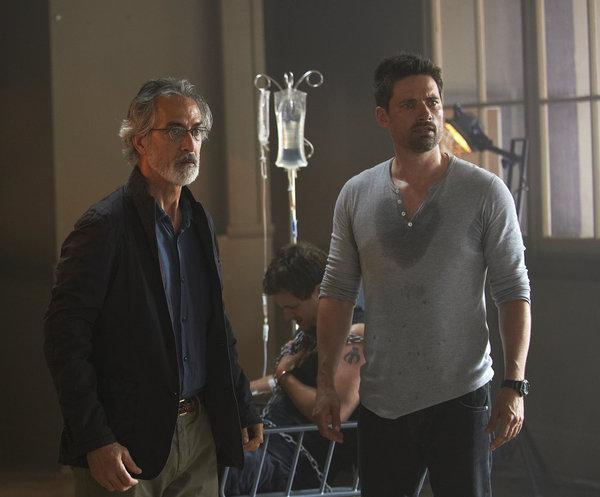If “Need to Know” could be described with a single word, it would have to be “confusing”. Not that it was convoluted – it lacked the ambition that it would need to flirt with such a lofty sin – but simply that it assumed the viewer was comfortable or familiar with some changes that have happened in the world of Alphas. After some initial excitement at their office, our protagonists either stuck with protocol and the FBI, or followed Rosen in his darker alternative approach. None of which particularly shined until Skylar Adams showed up.
In the show’s maiden season, because the storytelling was very linear, moving from one episode to the next was fairly straightforward from a character or a storyline perspective. However, in this second season, from the way the story has been jumping ahead or characters have been changing from one episode to the next, it often felt as if the series would have liked to have more episodes to develop its story. “Need to Know” essentially started with a scene in a meeting room where everyone chipped in on the hunt for Parish. And by everyone, I mean everyone, including people that were obviously only there to fill the room and help create what I guess was meant to be an atmosphere of crisis. Unfortunately, none of it conveyed a sense of urgency, but rather a clear sense of confusion. Confusion on the leadership (I never really understood what being ‘lead tactical’ entailed in our story), confusion on the plot (the meeting was clumsily and hastily used as a launchpad for many things that would come later), and confusion on the ability of the task force to deliver (the way the discussion progressed and ideas were thrown in didn’t exactly smack of competence).
From there, we discovered Rosen had his own hidden agenda and that’s when bad turned into worse, and I am not referring to the predictable and unimpressive evasion. Like I have briefly discussed already in a previous review, the other big change this season has been around Rosen. The reliable, protective leader of the team was turned into a bitter and conniving old man sneaking around Bill’s back instead of confronting him like he did in the previous season. Kat summed it up very well when she said, “The glasses, the messy hair, the cardigan, he seemed like such a nice old dude.” The issue is not so much that Rosen has changed, but it is that there seems to be no reason for it. It is almost as if the show changed its writers (which it did) and the new team decided to redesign its characters without easing us into the new reality. Cameron was never a straight arrow, so his behavior during the abduction can be ignored, but Nina’s recent flirting with her own power abuse should have turned the character into someone less inclined to follow a certain path. Even if you are alright with all the odd behaviors, there is still the issue with the abductee’s ability to resist Nina’s push while still having access to the information she was after.
The only consistent storyline of the episode was the one involving Skylar, the tech wiz alpha played by Summer Glau. The decision of altering the picture for the segments showing her in the apartment with her daughter was excellent. Those scenes conveyed a certain simplicity, a certain idea of artificial perfection without giving things away. The little breadcrumbs, like the absence of phones in the place, Skylar itching where the intravenous needle was in the real world, or the buzzing were all smoothly introduced in the virtual reality. Back in the real world, Gary’s investigation and attempts to contact Skylar made perfect sense. Even the real world conversation between Stanton Parish and the abductor was smoothly sneaked in. Up until she was freed, Skylar’s storyline was the most rewarding. By that point, the mini photic stimulators were center-stage and Skylar’s briefing turned out to be much more interesting than the opening scene meeting in the same room.
It should be said that although I very much liked the drama involving Skylar and her daughter, the episode failed to portray the tiny photic stimulators as instruments of doom. The world’s dependency on electricity and electronic devices is certainly established, but not such that causing a lot of casualties in some major cities in the U.S. spells doom for mankind. For that to work, all the people able to counter the attack would have to be near one device or machine plugged into a network under attack. I mean, nothing prevents the Navy or the Air Force from flying a plane (these flying contraptions are generally not plugged in and can be flown without using any radio, so they and their pilots would not be affected by photic stims) and bomb the entire city block where Parish and friends are located. Extreme, but effective.
“Need to Know” was one of those episodes of Alphas, like many others recently, with an interesting concept wasted in a sea of much less attractive stories and questionable character developments. From Parish’s lack of sustainable charisma to his organization’s difficulties to really convince the viewer of an impending doom, the stakes seemed to be too high for the episode to deliver.